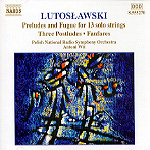This further installment in Naxos’ Lutoslawski series opens with the Three Postludes, works that occupy a key position in the composer’s output since they define a move away from his serially-influenced middle period works toward a more plainly-stated, direct personal style. Antoni Wit secures a taut, powerful account, with the complex running passagework and dense orchestration of No. 2 effectively reproduced by the clear, well-balanced recording from the Fitelberg Concert Hall, Katowice. Lutoslawski’s own 1976 recording of No. 1, with the same orchestra, has been issued on EMI’s Matrix label; Wit obviously takes this as his lead but gets a much finer recording and also presents the trilogy in full.
Arguably the most intriguing works here are the Preludes & Fugue for 13 solo strings. The principals of the PNRSO play these pieces with enough flair and spirited self-confidence to challenge if not surpass the performances on either of the two recordings made by Lutoslawski himself. Both of those feature the Polish Chamber Orchestra, though sonically the 1976 EMI account is vastly superior to the Polski Nagrania remake. On balance, you’ll get the best of all worlds with Wit’s capable performance on this Naxos disc. Of the remainder of this collection–mostly short fanfares written for various notable occasions–only the three-minute-long Mini Overture written for the Philip Jones Brass Ensemble in 1982 has been widely recorded. The Polish brass players are a sonorous, well-blended team, but if you’re not overly keen on Eastern-European brass playing and prefer something with more cut and thrust to it, there’s a particularly incisive alternative by the Stockholm Chamber Brass on BIS. No doubt most listeners will want this recording for the Preludes & Fugue rather than for this slight brass piece, and on that score, these performances–especially at the Naxos price–simply can’t be ignored.
































